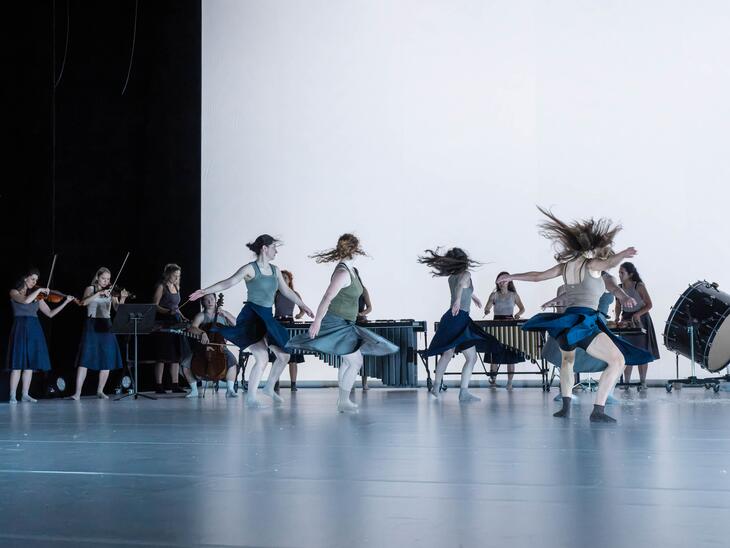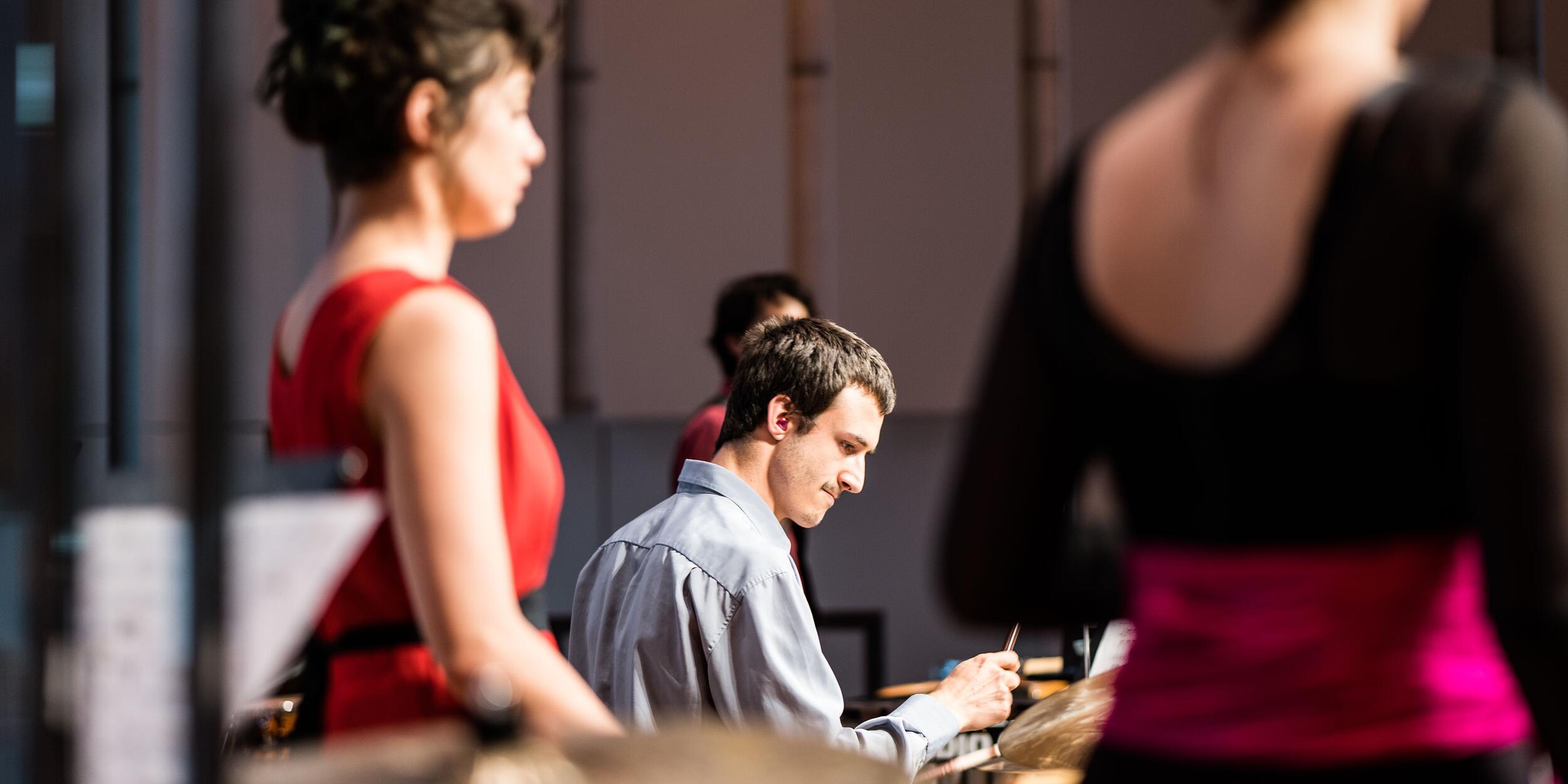
Save the date: The International Summer Course is in preparation and will take place in Salzburg from July 6-12, 2025.
+++ Registration for the entrance examination for teacher training (Art Education and Design:Technology.Textile) still possible until 10th June 2025 - all further information on the course pages! +++

The master's programme in Elemental Music & Movement Education enables students to build on their previous studies to develop creativity-driven approaches to music, dance and language and to support people in the way they express themselves artistically. Students engage with historical and contemporary art forms in an interdisciplinary manner, working together with experts in practice and learning how to initiate diverse encounters with the arts.
Department of Studies & Examinations
+43 676 88122 492
studienabteilung@moz.ac.at
Length of course
4 semesters / 120 ECTS-AP
Language
German
Downloads
Many students will already have begun to practice music and dance pedagogy in relevant fields on the basis of their undergraduate studies. Upon completion of this master’s programme, they will be highly qualified to plan, implement and reflect on learning processes within the field of music and dance in a variety of pedagogical contexts.
The aim of the study programme is to go beyond the bachelor's degree and to deepen the subject-specific, artistic, theoretical and didactic knowledge in the field of elemental music and dance education. Subject-specific and interdisciplinary topics are dealt with in a variety of artistic and academic formats, with all participants appreciating how interdisciplinary cooperation can be enriching for all involved. As part of this process, students experience diverse encounters with a contemporary, innovative and future-oriented artistic and pedagogical practice.
The research-based approaches introduced to students ensure that their future work is based upon reflected pedagogical practice in their area of artistic expertise as well as being underscored by sound theoretical knowledge. Students will choose either a performance artistic or a pedagogical and scholarly specialism, which informs their development of independent artistic projects and research questions respectively. During the course of their studies, students will build an individual academic profile by developing and diversifying their Individual competences. Particular emphasis is placed on further expansion and professionalisation in the following fields:
This four-semester course of study is modular in structure. Each module comprises teaching and learning content that has been combined to form thematically and didactically meaningful units of study. The names and content descriptions (study objectives) of the individual modules, the number of ECTS credits to be achieved for each module, and the type of performance assessment are specified in the curriculum. The module descriptions refer to the corresponding learning outcomes and competencies.
These contain the respective learning outcomes (knowledge, skills, competencies). The study programme covers the areas of creativity and design, artistry and technical skill, arts and educational sciences, and pedagogical practice. It is characterised by a consistent emphasis on the relationship between theory and practice. Artistic competencies are acquired and diversified. The course presents contemporary methods of teaching elemental music and dance, including performative formats. From this, skills for teaching music and dance are derived which are then transferred into diverse, constantly changing, pedagogical contexts, with special consideration given to social diversity.
Students of the Master's programme are encouraged to complete a semester abroad. Semesters 2 and 3 of the degree programme are particularly suitable for this. In addition to subject-specific competences, a study period abroad can also lead to the acquisition and deepening of:
Examinations and assessments taken during studies abroad can be approved by the Director of Studies as equivalents to compulsory subjects, elective subjects or free elective subjects required by the Mozarteum University for your degree course. The documents required for the approval procedure are to be submitted by the applicant immediately after their exchange semester.
Details at International Affairs
To obtain their Master’s degree qualification, students will undergo the following assessments:
Admission to an MA Performance programme requires the completion of a relevant bachelor's degree (BA) or other equivalent degree at a recognised domestic or foreign post-secondary educational institution (e.g. university, college) (§ 64 Para. 3 UG 2002).
A prerequisite for admission to this university course is also the successful completion of an audition. Registration for an audition is completed online via Muvac and requires candidates to upload documents proving their eligibility for the course. An invitation to audition will only be issued after the necessary documents have been submitted in full and approved by the admissions office.
PLEASE NOTE:
Applicants whose documents have been approved will be invited to the on-site audition. This consists of an instrumental audition and, if necessary, a test of German language skills.
Documents required for online application
Form of the documents
The entrance examination consists of the following sections, all of which must be passed:
A - Pedagogical aptitude (leading a group)
The focus of this part of the examination is to determine candidates’ aptitude for artistically oriented teaching practice with groups. Candidates will work with a group (usually fellow candidates) on a piece of their own choice (possibly a piece they have composed themselves) that they have prepared in advance, e.g. song or canon with or without accompaniment (body percussion, instruments, movements, gestures, dance), traditional dance or excerpt of a choreography, spoken word piece, simple ensemble piece (instrumental, vocal). The candidate must bring to the examination three copies of the material used, including the corresponding source information (e.g. sheet music, spoken piece, choreographic sketch, music selection) as well as three copies of their lesson plan (broken down into steps). The teaching demonstration will be evaluated afterwards.
B - Instrumental or Vocal Audition
Requirements for vocal auditions:
Requirements for instrumental auditions:
C - Practical music skills (general musical aptitude; vocal aptitude)
Requirements: General musical aptitude
All applicants must demonstrate their skills in percussion, which is determined by participation in an ensemble class under the direction of a teacher. Content will include question and answer games, imitation and coordination exercises.
Requirements: Vocal aptitude
All applicants will take a voice test, to include:
D - Practical dance skills (general aptitude in the group; solo study)
Requirements - general aptitude in a group:
Participation in a dance technique class (contemporary), examination in the group under the guidance of a teacher, including but not limited to the following elements: Guided warm up, realisation of movement material provided in the exam both on the spot and moving through the room, rhythmic exercises, contact and spatial orientation exercises, variation and interpretation of movement material and improvisation. (Duration approx. 45-60 minutes.)
Requirements - Solo study:
Performance of a prepared, individually designed movement/dance study on a freely chosen topic, e.g. presentation of a movement-exploration or dance movement scene, with movement material to be chosen by the candidate. The study can be designed with or without music and/or include other elements supporting or sustaining the performance (text, image, object, etc.). (Duration: minimum three to maximum five minutes.) This is followed by a short discussion on intention and process. Students should be prepared for the possibility of being asked to perform a spontaneous task relating to what they have presented, or to answer questions on their previous dance experience.
E - Music theory and aural skills
Examination of basic knowledge of general music theory (written and oral) including an aural test.
Requirements in the written part of the examination (approx. 60 minutes):
Requirements in the oral part of the examination (5-10 minutes):
Sample exam questions and further help for preparation can be found HERE.
F - German language skills
After passing Partial Examination A, you will be admitted to Partial Examinations B-D (possibly in a different order). The repetition of the sub-examinations A-C in case of failure is not permitted. The admission examination can only be repeated in its entirety and only in the next academic year. The admission examination can be repeated an unlimited number of times.
All parts of the entrance examination will take place in the period 16.6.-18.6.2025.
Please note that the Mozarteum University Salzburg offers various support options at the time of your audition and during your studies if you have a disability or a chronic illness.
If this applies to you and you would like to take advantage of counselling, please contact Claudia Haitzmann: claudia.haitzmann@moz.ac.at or +43 676 88122 337.
You can find more information about starting your studies here: